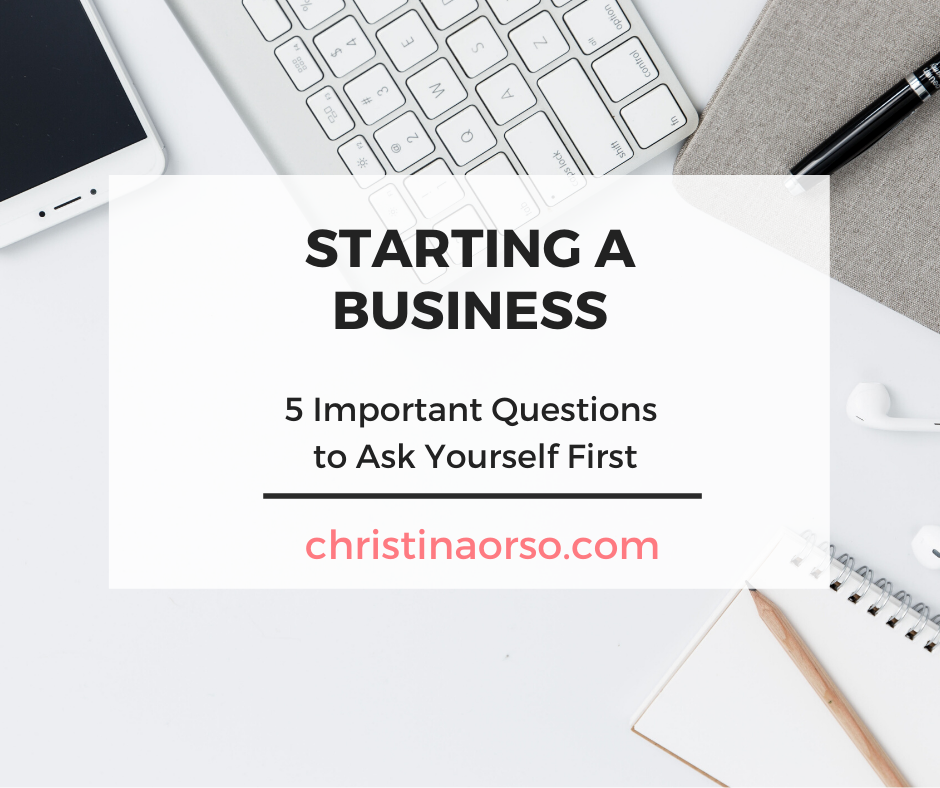Starting a business can be one of the most exhilarating and nerve-wracking things you’ll ever do. I cannot stress enough the importance of focusing on the exciting, fun new changes along the way so that minor stresses don’t become setbacks. When preparing to start a new venture, there are a few important questions to ask yourself to make sure you’re on the right track. While you can’t plan for every challenge that may come your way, having a clear path to walk down will make those hurdles easier to tackle.
1. What’s Your Goal?
By nature, I’m not always a goal-driven person. I often prefer to take things one step at a time and figure it out along the way. But that doesn’t bode well for starting a new business; having goals (multiple!) are crucial for success. Without a clear idea of where you want your business to go, you’ll find yourself stumbling through the beginning stages.
Set aside some time to write out your goals and outline what you can do to accomplish them. Include your short-term goals (1 – 12 month period) as well as long-term goals (1 yr an beyond). Once you have your goals written out, create a plan to help you accomplish them. It may also help to write down your motivation for starting a business in the first place: what you want to accomplish, what you hope to gain out of the experience, who you aim to help, and so on.
2. Are You Financially Ready?
When you first start a business, there are a few financial pieces to consider. Maybe you’re leaving a full-time job and will no longer receive a regular paycheck. Maybe your business requires significant startup costs. Maybe you need to consider the costs of being self employed, like paying for your own health insurance and equipment.
I’d strongly urge you to have some savings in the bank before you jump into a new venture. In the case that your business doesn’t immediately take off, you’ll have savings in the bank to aide you along the way. Before I left my full-time job I made sure I had saved the equivalent of a year and half salary. The goal was to never dip into it, which thankfully worked out, but had I not gotten enough projects right away, I had that as a safety net.
Aside from having a chunk in savings, you’ll need to consider what you realistically need to be making as an entrepreneur. Figuring out your hourly rates, project-based rates, and package options are things you should have a clear idea of before starting. Keep in mind that rates don’t have to be set in stone, but having numbers in mind to work with will certainly help when it comes time signing new deals.
3. Which Laws do You Need to Be Aware of?
First thing’s first, decide on the legal structure of your business. Whether you register as a limited liability company (LLC), a sole proprietorship, an S-Corp, do some research on the laws or talk to a lawyer about the pros and cons of each structure.
Most states will require you to register your business name. There will also be fees involved, so prepare for that too. I am registered as an LLC so I pay a whopping $500 to the state every year. Gulp. While yes, it is a tax deduction, it’s still something to prepare for.
4. Who is Your Support Network?
I was fortunate enough to have a mentor before I even realized I needed one. My former boss was my #1 cheerleader while I was at my full-time job. And while it seems wild to think that he encouraged me to leave his company, it’s because he saw great potential in me that I couldn’t even see before. Having someone who knows all the great things you’re capable of will be a huge help when the tough days get you down. They’ll be there to remind you why you started and why you must keep going.
Choose a mentor who will not only encourage you along the way, but someone who will guide you. Someone who is also an entrepreneur will be your best bet. Not only because they’ve been there, done this before, but they’ll be able to answer a lot of questions you have in the beginning. In my case, my mentor is an enrtepreneur of multiple ventures, but also a lawyer. Major win win.
5. Do you have the right attitude?
Starting a business requires a special mix of personality and character traits. There isn’t a formula that makes one individual more successful than another, but there are certain traits that business owners have. You’ll need to be passionate, disciplined, and dedicated. You’ll need to have effective communication skills, a positive mindset, and enough grit to carry on through the difficult times.
Moreover, keep in mind that you will constantly be making decisions. Not only for your business, but for your employees, your clients, and anyone else involved. Being able to weigh out pros and cons and confidently make decisions are key parts of being a successful business owner.
Are you considering starting a business? Got more questions? Feel free to reach out or drop a comment below!


